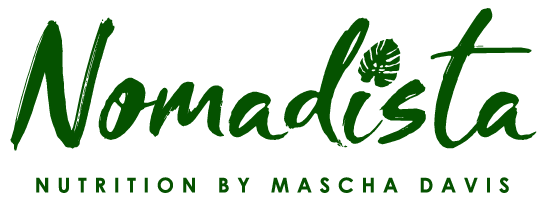Heart health is always important, but February gives us a special reminder to take care of our hearts. Last year, we covered the key nutrients to focus on and avoid for heart health. This year, I want to take things a step further and get into the practical side of things. I’ll be sharing a sample meal plan to help you incorporate heart-healthy choices into your daily routine. Plus, we’ll dive deeper into my #1 favorite nutrient for heart health—fiber!
What Is Fiber?
Fiber is the part of plant-based foods that your body can’t digest. While it passes through your digestive system largely intact, it plays a crucial role in regulating digestion, controlling blood sugar levels, and maintaining healthy cholesterol. There are two main types of fiber: soluble and insoluble. Both types are important for overall health, but today, we’ll focus on soluble fiber, as it has some special benefits for heart health.
Soluble vs. Insoluble Fiber
Soluble Fiber: This type dissolves in water and forms a gel-like substance. It helps lower LDL (the "bad" cholesterol) by about 5-10% because it binds to cholesterol molecules and removes them from your system. Foods rich in soluble fiber include oats, beans, lentils, pears, apples, and citrus fruits.
Insoluble Fiber: This fiber doesn’t dissolve in water. It adds bulk to your stool and helps food pass more quickly through your stomach and intestines. While it doesn’t have a direct effect on cholesterol, it’s still important for digestive health, particularly constipation. Whole grains, cruciferous vegetables, and nuts are great sources of insoluble fiber.
Recommended Fiber Intake
To reap the heart-healthy benefits of fiber, it's recommended that women consume about 25 grams of fiber per day and men about 38 grams. The average American typically consumes only 16 grams per day, so it looks like there's work to do! Let’s dive into how to make that possible!
Sample Heart-Healthy Meal Plan for Women
Here’s a sample meal plan that includes a variety of fiber-rich foods to help you reach your fiber goal while also supporting overall heart health. This plan is designed to provide around 25 grams of fiber for women.
Breakfast: Heart Healthy Oatmeal + Smoothie
½ cup oatmeal made with 1 cup skim milk, water or unsweetened almond milk
Toppings: 1 tbsp chia seeds or flax seeds, 1 tbsp sweetener of choice (honey, maple syrup)
Smoothie: Blend handful of spinach, 1/4 cup frozen berries, half a banana, and a cup of Florida Citrus orange juice for vitamin C and antioxidants.
Fiber Count: ~8 grams
Lunch: Omega-3 Packed Bean Salad
Mixed bean salad (1/2 cup chickpeas, black beans, kidney beans) with 1 cup diced veggies like bell peppers, tomatoes, and cucumbers
Dressing: 1 tbsp olive oil, lemon juice, and a sprinkle of sea salt
3 oz fatty fish like tinned salmon, mackerel, or sardines (rich in Omega-3s for heart health) I recommend the FishWife brand.
Fiber Count: ~7 grams
Afternoon Snack: Almonds & Apple
A handful of almonds
1 small apple with the skin on
Fiber Count: ~3-4 grams
Dinner: Balanced Veggie Stir-Fry
Veggie stir-fry with 1 cup mixed broccoli, spinach, carrots, and bell peppers
Serve over ½ cup quinoa or brown rice
Add 3-4 oz tofu or chicken breast for lean protein
Sauce: coconut aminos or low sodium teriyaki
Fiber Count: ~6 grams
Evening Snack: Dark Chocolate & Berries
A small square of dark chocolate (70% cocoa or higher)
A handful of fresh berries like raspberries or blackberries
Fiber Count: ~3 grams
Sample Heart-Healthy Meal Plan for Men
Here’s a sample meal plan designed to provide around 38 grams of fiber for men.
Breakfast: Savory Smoked Salmon Avocado Toast
2 slices whole grain toast (Dave’s Killer Thin Sliced is great!) topped with ½ mashed avocado, 3 oz smoked salmon, and a sprinkle of chia seeds or flax seeds
A side of mixed berries (raspberries, blackberries, or strawberries)
Fiber Count: ~12 grams
Lunch: Plant Powered Lentil + Tofu Salad
1.5 cups lentil salad with diced cucumbers, cherry tomatoes, red onion, and a lemon-olive oil dressing + 4 oz firm tofu
Fiber Count: ~7 grams
Afternoon Snack: Hummus & Carrot Sticks + 1 Small Pear
A generous serving of hummus (about 1/4 cup) with carrot sticks for dipping
Add a small pear (with skin on)
Fiber Count: ~7 grams
Dinner: Lean Chicken & Veggie Stir-Fry
Stir-fry with 5 oz lean chicken breast, 2 cups mixed vegetables (broccoli, bell peppers, mushrooms, spinach), and ¾ cup quinoa or brown rice
Sauce: coconut aminos or low sodium teriyaki
Fiber Count: ~9 grams
Evening Snack: Greek Yogurt & Berries
1 cup plain low fat Greek yogurt with a handful of fresh berries and a sprinkle of ground flaxseeds
Fiber Count: ~3 grams
As you can see, by making small adjustments to your diet—like adding more fiber-rich foods and focusing on soluble fiber—you can make a big difference for your heart.
This February, let's take a step toward better heart health by prioritizing fiber. You don’t need to make drastic changes overnight, but with these small, actionable steps, you’ll be well on your way to a healthier heart for years to come.
What’s your favorite high-fiber food? Do you already incorporate it into your meals? Let me know in the comments!




